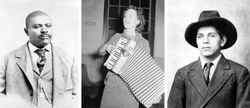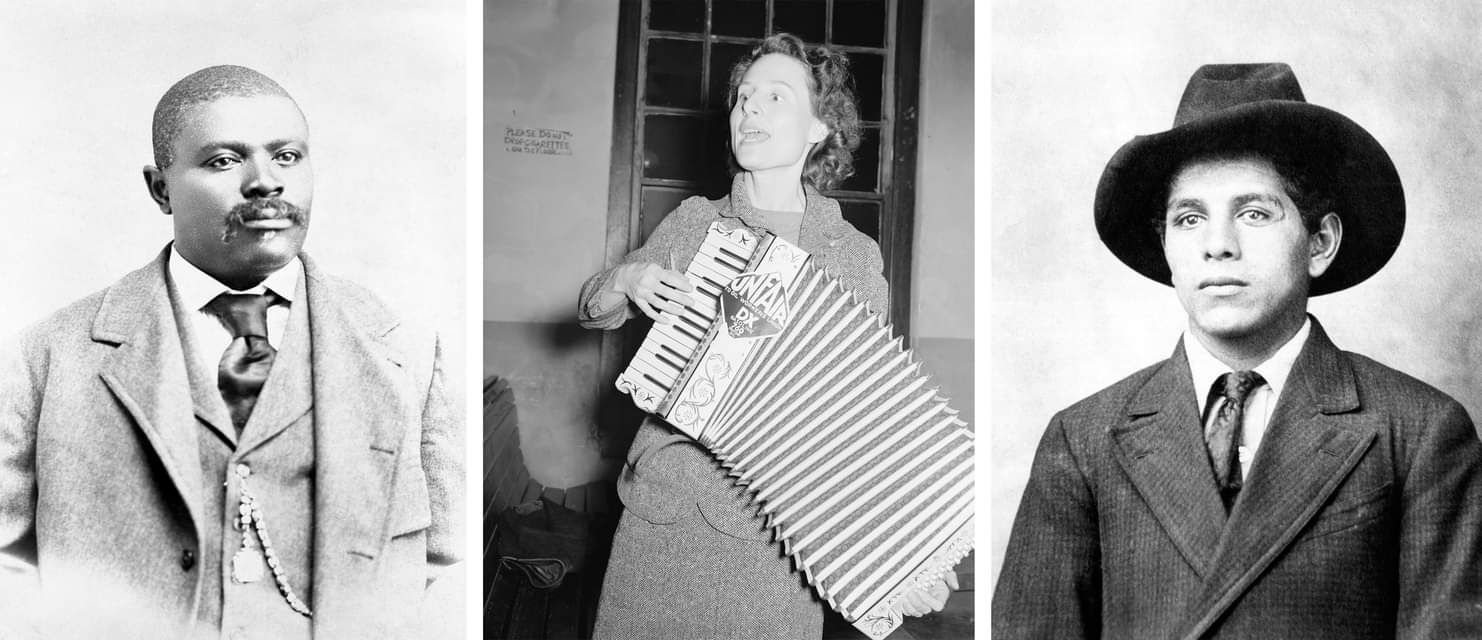PERKINS, THE LION, IS NO MORE.
Judge Napier G. Perkins, editor of the Guide, organ of Logan county colored people, died at six o'clock last evening, after a brief illness. His death was due to the effect of a hospital operation coupled with his advanced years. The deceased was 74 years of age. His wife died three years ago and no relatives survive him. The funeral will take place at 2 o'clock Thursday afternoon from the Afro-Methodist church.
Judge Perkins came to Guthrie from Little Rock, Ark., in 1889. He became at once interested in Republican national and county politics and was one of the most potent negro politicians in the state.
In early reconstructive days in the early seventies, Judge Perkins was a carpet-bagger official sent into Arkansas to hold office. He was appointed a district judge and held that office thirteen months. Later he was elected a member of the Little Rock city council.
Upon moving to Guthrie, Perkins became the center of several stirring events.
During the first and only so-called "race war" ever known in Guthrie, Perkins was the leader of the negro mob. He was chased to the Cottonwood banks by a white mob. A rope was placed around his neck by Harvey Olds, now of Tulsa. As the noose tightened, Perkins prayed. Cooler heads then prevailed and Perkins was released on promise to be good thereafter. And he was good. He became a stalwart citizen and was liked by both black and white. There was no meanness in Perkins, though he was rantankerous at all times for the rights of Aunt Hagar's children."
In 1890 Perkins founded the Guide, a weekly folio, which was sometimes hardly legible, but always picturesque. Perkins was elected to the city council two times from the famous "Fifth ward," now but a legend. His speeches as a member of that body in the interest of economy and my people" caused laughter so loud and long that many near fights were averted in the belligerent body. As chairman of successive Republican county conventions, Perkins shone incandescently. Jake Carter, another negro political, always annoyed Perkins.
The Oklahoma Guide. (Guthrie, Okla.), Thursday, October 15, 1914
The funeral service of Judge G.N. Perkins was held at the Macedonia Church last Thursday afternoon, the church was crowded and as many were on the outside. He was a member of Eureka Lodge and was buried with Masonic honors. He was a member of the Western Star Chapter No. 1 O.E.S. The Royal Grand Matron was present and spoke on the life of their deceased member.
Rev. Franklin offered prayer, Rev. J.W. Jones read the 90th Division of Psalms, Rev. Dobbins read the obituary, the choir sang Holy! Holy! Holy!, one of the deceased favorite songs.
Rev. S.A. Clark preached a short and appropriate sermon Subject: The tallest tree of Lebanon has fallen", Judge A.H. Roles was introduced and made a strong speech that set many of our people to thinking. He said a great many good things about the deceased, among them was: I hope the Lord will raise up another many among you to take Judge Perkins' place, you people have lost your leader; where will you find another?"
Mrs. J.C. Horton also said many good things concerning the life of Judge G.N. Perkins.
A great many friends desired to speak a word but time would not permit.
He was laid to rest in the family lot beside his wife in Summit View Cemetery.
The Oklahoma Guide. (Guthrie, Okla.), Thursday, October 15, 1914
OBITUARY
George Napier Perkins, was born in the state of Tenn., Williamson County, Jan. 1, 1842.
He left there when quite a boy and went to state of Arkansas, there he grew to manhood and enlisted as a soldier in the federal army and served about three years. After the war he married Maggie A. Dillard and lived in the town of Woodson that was founded by him.
In 1873 he was admitted to the bar to practice law and moved to Little Rock, Ark. He was a member of the Constitutional Convention of the State of Arkansas. He served four years as a member of the City Council of Little Rock. After remaining in the state of Arkansas about 30 years, altho making financial success and being admired by all who knew him, he became dissatisfied at the limited freedom of his people and decided to come to Oklahoma Territory, then a new and promising country in search of freedom for his people.
He and family moved to Guthrie, Okla. in 1890, where he resumed his law practice and established a Negro Journal (The Oklahoma Guide) which has been published in the interest of the Negro race.
He has been living under the Baptist Banner for more than 50 years. He was a great church worker and great lover of Sunday School.
He was confined to his bed about 6 days. During his illness he was very patient, altho in a semi-conscious condition the last few days of his life; he would recognize relatives and friends with a smile.
He died Oct. 6, 1914.
He leaves a step son, two nephews and several nieces to follow. His wife died Nov. 1, 1902.
PERKINS, THE LION, IS NO MORE.
Judge Napier G. Perkins, editor of the Guide, organ of Logan county colored people, died at six o'clock last evening, after a brief illness. His death was due to the effect of a hospital operation coupled with his advanced years. The deceased was 74 years of age. His wife died three years ago and no relatives survive him. The funeral will take place at 2 o'clock Thursday afternoon from the Afro-Methodist church.
Judge Perkins came to Guthrie from Little Rock, Ark., in 1889. He became at once interested in Republican national and county politics and was one of the most potent negro politicians in the state.
In early reconstructive days in the early seventies, Judge Perkins was a carpet-bagger official sent into Arkansas to hold office. He was appointed a district judge and held that office thirteen months. Later he was elected a member of the Little Rock city council.
Upon moving to Guthrie, Perkins became the center of several stirring events.
During the first and only so-called "race war" ever known in Guthrie, Perkins was the leader of the negro mob. He was chased to the Cottonwood banks by a white mob. A rope was placed around his neck by Harvey Olds, now of Tulsa. As the noose tightened, Perkins prayed. Cooler heads then prevailed and Perkins was released on promise to be good thereafter. And he was good. He became a stalwart citizen and was liked by both black and white. There was no meanness in Perkins, though he was rantankerous at all times for the rights of Aunt Hagar's children."
In 1890 Perkins founded the Guide, a weekly folio, which was sometimes hardly legible, but always picturesque. Perkins was elected to the city council two times from the famous "Fifth ward," now but a legend. His speeches as a member of that body in the interest of economy and my people" caused laughter so loud and long that many near fights were averted in the belligerent body. As chairman of successive Republican county conventions, Perkins shone incandescently. Jake Carter, another negro political, always annoyed Perkins.
The Oklahoma Guide. (Guthrie, Okla.), Thursday, October 15, 1914
The funeral service of Judge G.N. Perkins was held at the Macedonia Church last Thursday afternoon, the church was crowded and as many were on the outside. He was a member of Eureka Lodge and was buried with Masonic honors. He was a member of the Western Star Chapter No. 1 O.E.S. The Royal Grand Matron was present and spoke on the life of their deceased member.
Rev. Franklin offered prayer, Rev. J.W. Jones read the 90th Division of Psalms, Rev. Dobbins read the obituary, the choir sang Holy! Holy! Holy!, one of the deceased favorite songs.
Rev. S.A. Clark preached a short and appropriate sermon Subject: The tallest tree of Lebanon has fallen", Judge A.H. Roles was introduced and made a strong speech that set many of our people to thinking. He said a great many good things about the deceased, among them was: I hope the Lord will raise up another many among you to take Judge Perkins' place, you people have lost your leader; where will you find another?"
Mrs. J.C. Horton also said many good things concerning the life of Judge G.N. Perkins.
A great many friends desired to speak a word but time would not permit.
He was laid to rest in the family lot beside his wife in Summit View Cemetery.
The Oklahoma Guide. (Guthrie, Okla.), Thursday, October 15, 1914
OBITUARY
George Napier Perkins, was born in the state of Tenn., Williamson County, Jan. 1, 1842.
He left there when quite a boy and went to state of Arkansas, there he grew to manhood and enlisted as a soldier in the federal army and served about three years. After the war he married Maggie A. Dillard and lived in the town of Woodson that was founded by him.
In 1873 he was admitted to the bar to practice law and moved to Little Rock, Ark. He was a member of the Constitutional Convention of the State of Arkansas. He served four years as a member of the City Council of Little Rock. After remaining in the state of Arkansas about 30 years, altho making financial success and being admired by all who knew him, he became dissatisfied at the limited freedom of his people and decided to come to Oklahoma Territory, then a new and promising country in search of freedom for his people.
He and family moved to Guthrie, Okla. in 1890, where he resumed his law practice and established a Negro Journal (The Oklahoma Guide) which has been published in the interest of the Negro race.
He has been living under the Baptist Banner for more than 50 years. He was a great church worker and great lover of Sunday School.
He was confined to his bed about 6 days. During his illness he was very patient, altho in a semi-conscious condition the last few days of his life; he would recognize relatives and friends with a smile.
He died Oct. 6, 1914.
He leaves a step son, two nephews and several nieces to follow. His wife died Nov. 1, 1902.
Gravesite Details
Ref: Cemetery Records (they appear to use burial year as death year)
Family Members
Sponsored by Ancestry
Advertisement
Records on Ancestry
Advertisement







